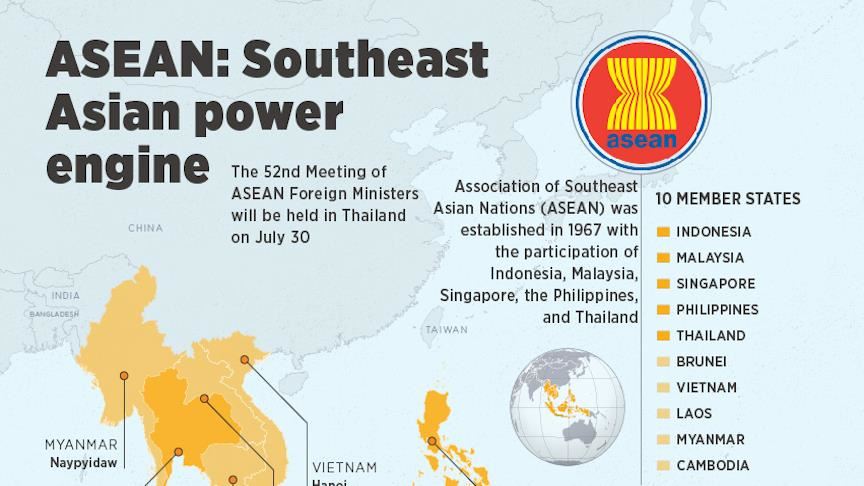ASEAN: Southeast Asian power engine
Thailand will host ASEAN Foreign Ministers’ 52nd Meeting on July 30, Turkey attending as sectoral dialogue partner

KUALA LUMPUR
The 52nd Meeting of ASEAN Foreign Ministers will be held in Thailand on July 30.
Foreign Minister Mevlut Cavusoglu will represent Turkey which is participating in the meeting as a sectoral dialogue partner.
Association of Southeast Asian Nations (ASEAN) was established in 1967 with the participation of Indonesia, Malaysia, Singapore, the Philippines, and Thailand after need for cooperation arose against political instability and lack of security caused by spreading communism in Southeast Asia during Cold War era.
The association today has ten members after Brunei joined in 1984, Vietnam in 1995, Laos and Myanmar in 1997, and Cambodia in 1999. Papua New Guinea and East Timor are two observer states in ASEAN.

ASEAN's role in regional peace and stability
During the Cambodia–Vietnam War in 1978-1979, ASEAN, for the first time, undertook a mediatory role as a regional power.
ASEAN helped bringing Cambodia–Vietnam clashes onto the agenda of the United Nations General Assembly, and played an effective role in ceasefire in Cambodia, the disarmament of the clashing parties as well as starting peace talks.
The southeast Asian Nuclear-Weapon-Free Zone Treaty (SEANWFZ), which was signed in Bangkok by member states in 1995, was a historic step towards creating a peaceful environment in Southeast Asia. According to SEANWFZ, parties (states) are obliged not to develop, manufacture or otherwise acquire, possess or have control over nuclear weapons.
ASEAN also signed ''Declaration on the Conduct of Parties in the South China Sea'' in 1992 in order to alleviate tensions among parties after an oil exploration crisis between China and Vietnam in the Spratly Islands in South China Sea.
ASEAN has also ongoing efforts to ensure peace in Rakhine State and help Rohingya people repatriate to their home.
ASEAN's external affairs
ASEAN signed the Treaty of Amity and Cooperation in Southeast Asia (TAC), aiming to extend peace environment settled in Southeast Asia, in 1976. Turkey signed the treaty in 2010.
The ASEAN Regional Forum (ARF), established in 1994 with 36 members, is based on the principles of solidarity and cooperation in international security.
ASEAN+3, which was established in 1997 by China, Japan and South Korea following the Asian Financial Crisis, played an active role in helping economic recovery of the affected countries.
ASEAN, world's 5th largest economy
The estimated total gross domestic product (GDP) of ASEAN states was approximately $2.8 trillion in 2018, making it the fifth-largest economy of the world. This figure is expected to exceed $6 trillion by 2030.
ASEAN drew foreign direct investments worth of $114.5 billion in 2018 which made it the third largest in the world in this aspect.
ASEAN Free Trade Area (AFTA) and ASEAN Economic Community, shaped up under ASEAN, ease trade among member states with low tariffs.
Unemployment rate was recorded 4.1%, while youth unemployment was 12.9% in 2016 in ASEAN which has approximately 650 million population with over 200 million young population.
Turkey's role in ASEAN
Turkey decided to develop its relations with ASEAN member states in 1999, and it was granted the status of Sectoral Dialogue Partner in 2017.
Foreign Minister Mevlut Cavusoglu will represent Turkey in the 52nd ASEAN Foreign Ministers’ meeting.
Turkey's trade volume with ASEAN countries, which was around $1.3 billion in 2002, increased to $8.7 billion in 2018.
Direct foreign investment from Turkey to ASEAN rose 55% in 2018 compared to 2017.
Turkey, which has a free trade agreement with Malaysia and Singapore, is now holding talks with Thailand and Indonesia.
Turkish Cooperation and Coordination Agency (TIKA) invested $147.8 million in the region between 2005-2015.
*Writing by Faruk Zorlu
Anadolu Agency website contains only a portion of the news stories offered to subscribers in the AA News Broadcasting System (HAS), and in summarized form. Please contact us for subscription options.




